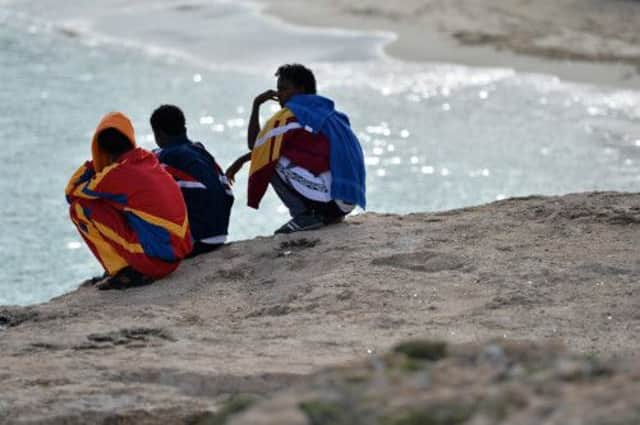EU leaders kick boat refugee tragedy into long grass


The Italian coastguard assisted five crowded boats in the Mediterranean Sea, near Sicily, which were carrying a total of 705 migrants, it said yesterday. All were taken to safety except for one migrant who reportedly fell into the sea during rescue operations by a Maltese cargo ship. A search was launched.
About 365 people drowned in an 3 October capsizing near Lampedusa, an Italian island that is closer to North Africa than to the European mainland.
Advertisement
Hide AdAdvertisement
Hide AdFollowing the tragedy, EUofficials set up a taskforce seeking, among others, to improve the system of maritime border patrols.
The European Commission also mobilised a few additional funds for Lampedusa, but the latest migrant arrivals since Thursday underscored that the problem persisted.
“We had a long discussion on refugee policies following the horrible events in the Mediterranean and on the island of Lampedusa,” German chancellor Angela Merkel said after the two-day Brussels summit of EU leaders ended yesterday.
“We all have expressed that we are deeply troubled over the events that we had to witness off Lampedusa.”
Italy, Malta, Greece and Spain – the main gateways for refugees from the south – had pushed for the topic to be put on the meeting’s agenda in the hopes of achieving better burden-sharing, but the talks yielded neither concessions from northern Europeans nor more funding for border patrol agency, Frontex.
Germany and others pointed out that they already receive significantly more asylum applications per capita than Italy and other southern countries.
Thousands of migrants reach Italy’s shores every year, but they often use it as a transit point. Germany received about 80,000 asylum applications in 2012, while Italy registered 16,000, according to EU statistics.
In their concluding statement, the leaders said they expect to discuss the findings of the newly set up migration taskforce at their next summit in December.
Advertisement
Hide AdAdvertisement
Hide AdThey also stressed “the importance of addressing root causes of migration flows by enhancing co-operation with the countries of origin and transit, including through appropriate EU development support and an effective return policy.”
Italian prime minister Enrico Letta, among southern European leaders who had called for urgent action from the EU summit, put a brave face on the outcome, saying EU leaders had shown solidarity with countries bearing the brunt of the problem.
“I think that we reached the key result that the issue has become a European issue, not simply an Italian issue, or Maltese, or Greek,” he said.
However, he added that this would not be sufficient unless the EU followed it up with practical steps.
Malta’s prime minister Joseph Muscat said on Thursday it was “surreal” that the digital economy was at the top of the leaders’ agenda when people were dying in the Mediterranean.
Dalia Grybauskaite, president of Lithuania, current holder of the EU presidency, denied it was “business as usual” in dealing with migrants, but admitted: “Today, Europe is not ready to accept as many refugees as probably can flow in.”
Human rights groups condemned the EU’s inaction.
It “shows that the expressions of sadness and solidarity were nothing more than crocodile tears” Amnesty International official Nicolas Beger said.
“Europe’s priority clearly is not to save lives or to protect people along the borders. It is to prevent people from arriving in Europe at all costs, even if those people are in need of safety and protection,” he added.
Advertisement
Hide AdAdvertisement
Hide AdAdvocacy groups such as Human Rights Watch have urged the EU to increase its sea patrols and discourage clandestine crossings by smugglers by guaranteeing that anyone picked up at sea will be taken to a safe European port.
Some EU officials argued that making boat migration safe will amount to an open invitation, thus increasing the number of refugees risking their lives.